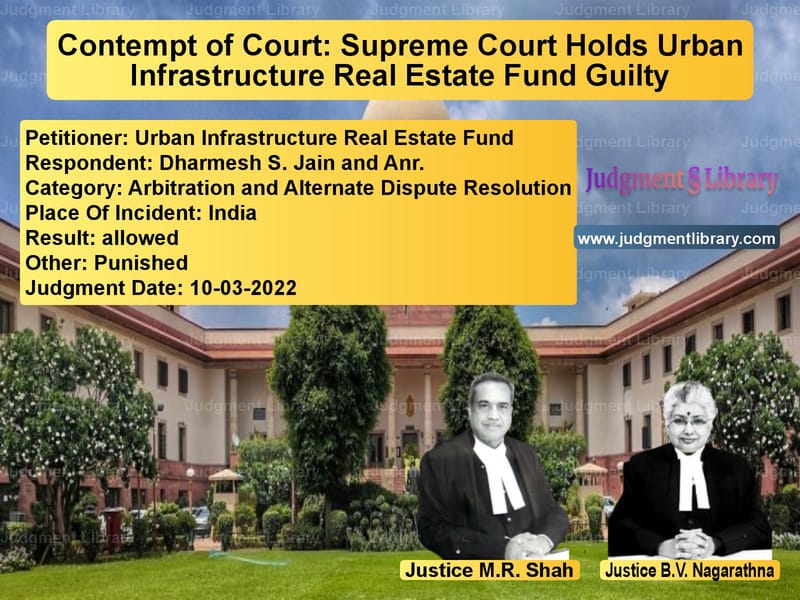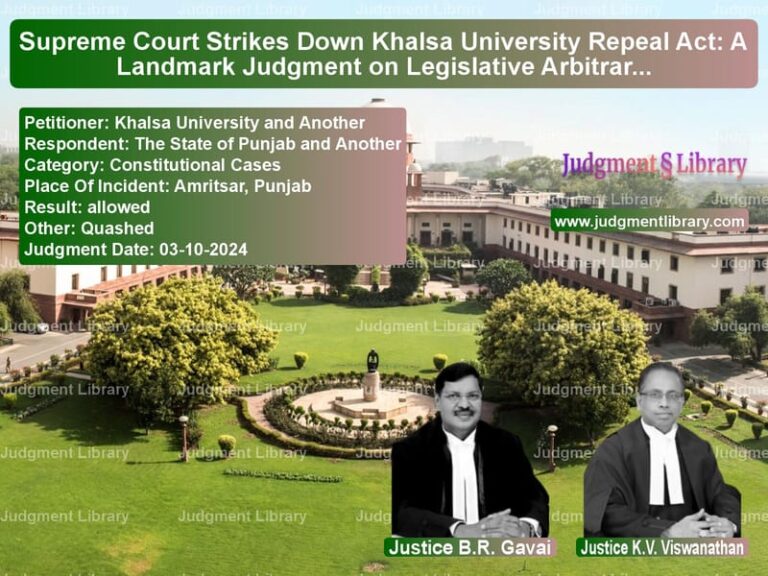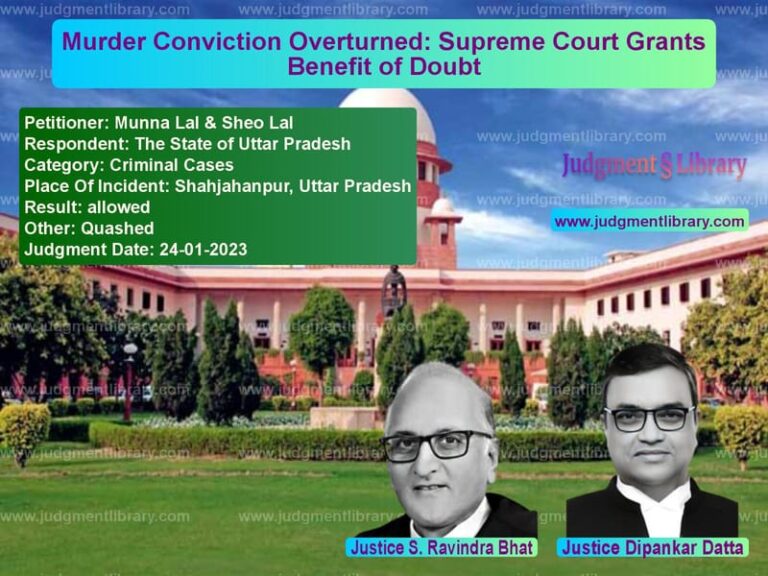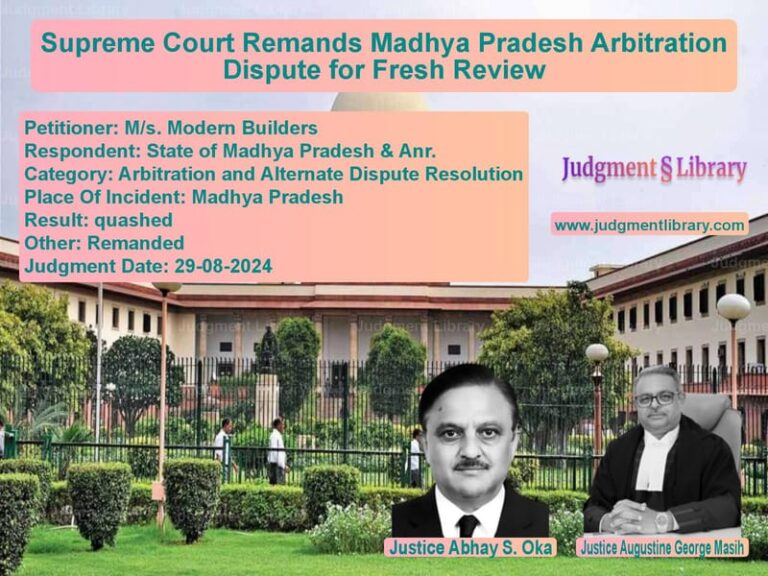Contempt of Court: Supreme Court Holds Urban Infrastructure Real Estate Fund Guilty
The Supreme Court of India recently delivered a significant judgment in the case of Urban Infrastructure Real Estate Fund vs. Dharmesh S. Jain and Anr., addressing the issue of contempt of court in an arbitration-related dispute. The ruling sheds light on the consequences of willful disobedience of judicial orders, emphasizing the need for compliance with court directives.
Background of the Case
The dispute originated from an arbitral award dated August 30, 2018, in which the learned arbitrator ruled in favor of the petitioner, Urban Infrastructure Real Estate Fund, granting them specific performance of a Share Purchase Agreement and awarding an amount of Rs. 78,33,37,500 with an interest rate of 18% per annum from December 20, 2014, until realization.
The respondents, dissatisfied with the arbitral award, challenged it by filing a Commercial Arbitration Petition before the High Court under Section 34 of the Arbitration and Conciliation Act, 1996. They also sought a stay of the award, leading the Single Judge of the High Court to grant a conditional stay on August 8, 2019, provided that the respondents deposited 50% of the awarded sum within twelve weeks. The order explicitly stated that failure to deposit the amount would result in the automatic vacating of the stay.
Failure to Comply with Court Orders
Despite multiple extensions and opportunities provided by the courts, the respondents repeatedly failed to comply with the deposit requirement. The timeline of key events is as follows:
- November 18, 2019: The High Court directed the respondents to file an affidavit disclosing their assets.
- July 29, 2021: The respondents’ appeal against the August 8, 2019 order was dismissed as not maintainable.
- September 17, 2021: The Supreme Court dismissed the respondents’ Special Leave Petition (SLP) challenging the High Court’s order but granted them an additional eight weeks to comply with the deposit condition.
- October 28, 2021: The Supreme Court reiterated that non-compliance with its order would be taken seriously and have “serious consequences.”
- January 17, 2022: The respondents filed an application seeking to recall the Supreme Court’s October 28, 2021 order, which was subsequently dismissed on January 25, 2022.
Petitioner’s Arguments
- The respondents were engaging in deliberate delay tactics to evade compliance with court orders.
- Despite multiple extensions, the respondents had failed to deposit the required 50% of the awarded amount.
- The respondents had been given ample opportunity to comply but continued to willfully disobey judicial directives.
Respondent’s Arguments
- They argued that the failure to deposit the amount was not willful but due to financial constraints.
- The arbitral award should be executed rather than invoking contempt proceedings.
- They claimed that the order requiring deposit was “directory” rather than “mandatory,” meaning non-compliance should not attract contempt.
Supreme Court’s Observations
- The Court held that the respondents had engaged in “abusive litigation tactics” by repeatedly delaying compliance.
- The respondents had taken contradictory stands—initially seeking time to deposit the amount and later claiming financial hardship.
- The Court rejected the argument that the order was “directory” and reaffirmed that non-compliance constituted contempt.
- The respondents had filed a recall application only after contempt proceedings were initiated, indicating an attempt to evade responsibility.
The Court stated:
“The respondents have willfully disobeyed the order passed by the High Court dated 08.08.2019 and the order dated 28.10.2021 passed by this Court. Such conduct amounts to contempt of court and must be met with strict consequences.”
Final Judgment
- The Supreme Court held the respondents guilty of contempt of court.
- The Court directed the respondents to be punished under the Contempt of Courts Act, 1971.
- The Court emphasized that failure to comply with judicial orders weakens the credibility of the legal system.
Key Takeaways
- Compliance with Court Orders is Mandatory: Litigants must comply with court orders, and non-compliance can lead to contempt proceedings.
- Delaying Tactics Will Not Be Tolerated: The judgment warns against using legal maneuvers to delay the execution of lawful orders.
- Financial Hardship is Not an Excuse: The Court rejected claims of financial hardship, emphasizing that orders must be followed regardless.
- Arbitration Awards Must Be Respected: The ruling strengthens the enforceability of arbitration awards, ensuring they are not ignored by unsuccessful parties.
Conclusion
This Supreme Court ruling is a landmark decision reinforcing the sanctity of court orders. It sends a strong message that willful disobedience of judicial directives will not be tolerated, especially in arbitration cases where parties attempt to delay enforcement. The judgment upholds the rule of law and ensures that court judgments are respected and implemented in a timely manner.
Petitioner Name: Urban Infrastructure Real Estate Fund.Respondent Name: Dharmesh S. Jain and Anr..Judgment By: Justice M.R. Shah, Justice B.V. Nagarathna.Place Of Incident: India.Judgment Date: 10-03-2022.
Don’t miss out on the full details! Download the complete judgment in PDF format below and gain valuable insights instantly!
Download Judgment: urban-infrastructure-vs-dharmesh-s.-jain-and-supreme-court-of-india-judgment-dated-10-03-2022.pdf
Directly Download Judgment: Directly download this Judgment
See all petitions in Enforcement of Awards
See all petitions in Dispute Resolution Mechanisms
See all petitions in Arbitration Act
See all petitions in Institutional Arbitration
See all petitions in Commercial Arbitration
See all petitions in Judgment by Mukeshkumar Rasikbhai Shah
See all petitions in Judgment by B.V. Nagarathna
See all petitions in allowed
See all petitions in Punished
See all petitions in supreme court of India judgments March 2022
See all petitions in 2022 judgments
See all posts in Arbitration and Alternate Dispute Resolution Category
See all allowed petitions in Arbitration and Alternate Dispute Resolution Category
See all Dismissed petitions in Arbitration and Alternate Dispute Resolution Category
See all partially allowed petitions in Arbitration and Alternate Dispute Resolution Category







